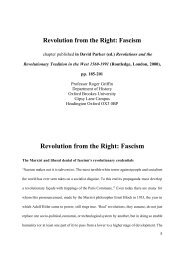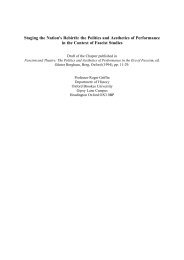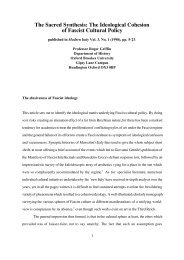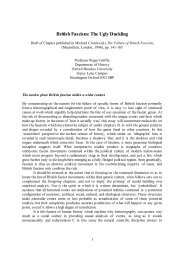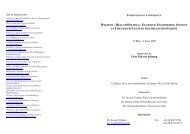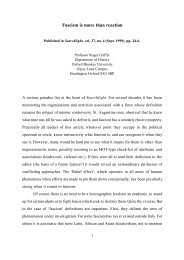The palingenetic core of generic fascist ideology - School of Arts and ...
The palingenetic core of generic fascist ideology - School of Arts and ...
The palingenetic core of generic fascist ideology - School of Arts and ...
Create successful ePaper yourself
Turn your PDF publications into a flip-book with our unique Google optimized e-Paper software.
(1991) seemed yet another ‘maverick’ attempt to resolve what was still universally<br />
regarded as the intractable ‘<strong>fascist</strong> conundrum’. It is somewhat ironic, then, if the<br />
subsequent emergence <strong>of</strong> the new paradigm can now make that book appear part <strong>of</strong><br />
an orthodoxy, or even ‘groundbreaking’, rather than what it was easy to dismiss as<br />
at the time: an over-ambitious, over-condensed, highly idiosyncratic, jejune attempt<br />
to resolve the whole <strong>of</strong> the <strong>fascist</strong> debate in one fell swoop: ‘Everything you ever<br />
wanted to know about fascism <strong>and</strong> never dared to ask’. But though <strong>The</strong> Nature <strong>of</strong><br />
Fascism had many <strong>of</strong> the characteristic faults <strong>of</strong> books based on doctorates, it also<br />
had some features which I hope will st<strong>and</strong> the test <strong>of</strong> time (which in the postmodern<br />
age means a few years at most!).<br />
First, no matter how heavy-going it is to read, chapter one was original in<br />
<strong>of</strong>fering an analysis, heavily indebted to Max Weber’s methodological precepts, <strong>of</strong><br />
why the debate over the definition <strong>of</strong> fascism had been so convoluted, focusing<br />
attention on the ideal-typical nature <strong>of</strong> all <strong>generic</strong> concepts in the social sciences. It<br />
argued that as a <strong>generic</strong> concept ‘fascism’ could have no empirical essence to serve<br />
as the basis <strong>of</strong> an objective definition: the ‘<strong>fascist</strong> minimum’ had to be invented ‘ not<br />
discovered ‘ through a process <strong>of</strong> ‘idealizing abstraction’. <strong>The</strong> dialogue <strong>of</strong> the deaf<br />
into which much <strong>of</strong> the debate over fascism had degenerated in the past was<br />
attributable to the naive methodological realism which led most participants to treat<br />
their own theory as ‘true’, rather than as a heuristic device to be judged solely in<br />
terms <strong>of</strong> its usefulness as a tool for empirical research. I still consider the recognition<br />
<strong>of</strong> the essentially ‘imagined’ <strong>and</strong> experimental nature <strong>of</strong> any definition <strong>of</strong> fascism a<br />
vital premise to the spirit <strong>of</strong> openness which must prevail in <strong>fascist</strong> studies for them<br />
to progress without the dogmatism <strong>and</strong> small-mindedness which have <strong>of</strong>ten been<br />
displayed in the past. <strong>The</strong> Tarzan/Godzilla-like enmity which occasionally breaks<br />
out over the definition <strong>of</strong> fascism between academics with vulnerable male egos is<br />
particularly unfortunate given the topic they are working on.<br />
Second, the ideal type <strong>of</strong>fered in <strong>The</strong> Nature <strong>of</strong> Fascism seems<br />
retrospectively to have captured the spirit <strong>of</strong> the embryonic new consensus both<br />
with its Spartan, ‘autarchic’ simplicity, <strong>and</strong> with the central emphasis it put on<br />
rebirth. After decades <strong>of</strong> theories <strong>of</strong> fascism which at best <strong>of</strong>fered elaborate check-<br />
lists <strong>of</strong> its main features, <strong>and</strong> at worst took the form <strong>of</strong> discursive descriptions, not<br />
4




